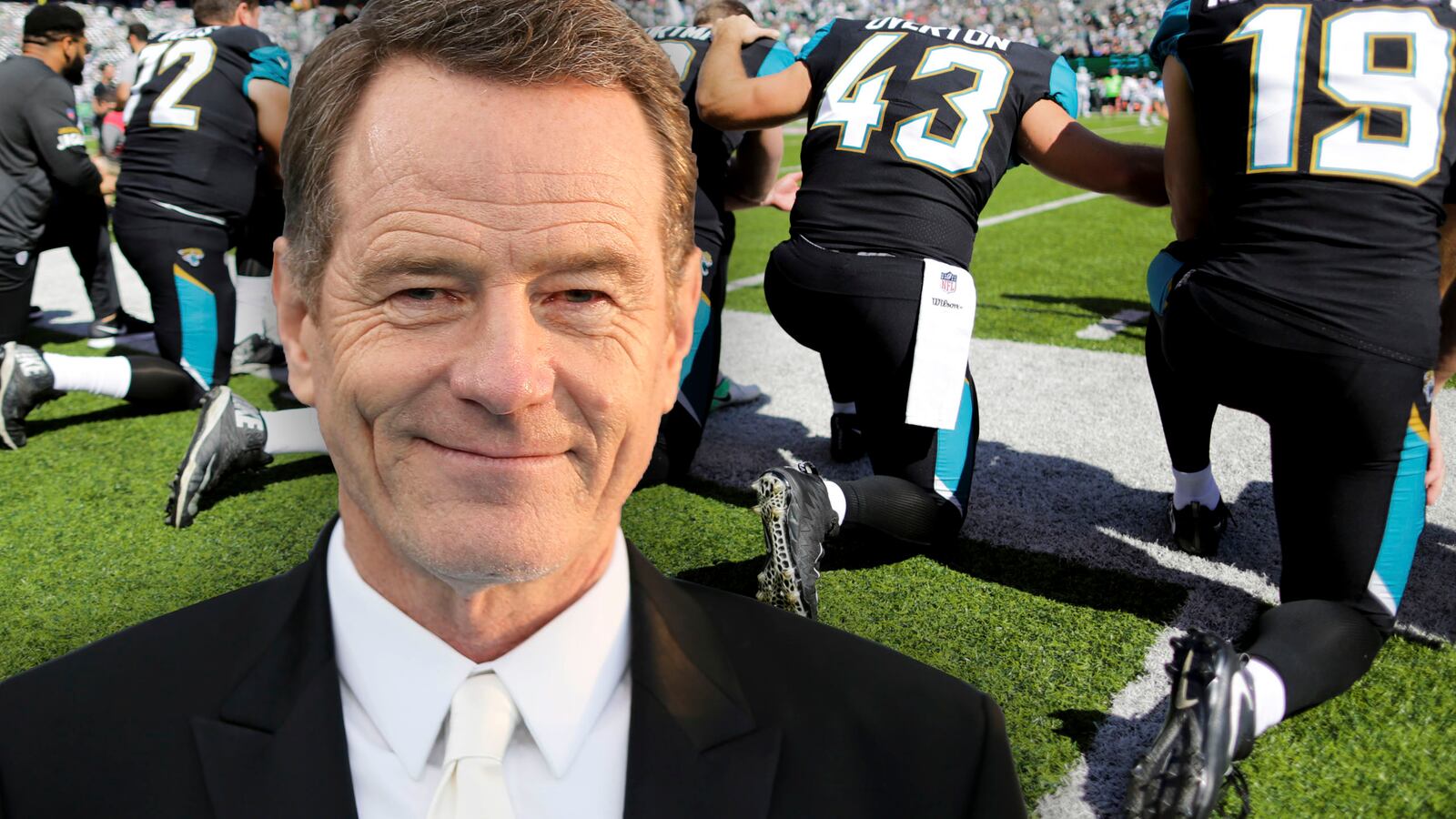The American flag—and what it means to honor and serve it—is a topic that waves prominently in Bryan Cranston’s new film, so much so that it’s in the title, Last Flag Flying.
Directed by Richard Linklater (Boyhood, the Before Sunrise trilogy), the film, which opened the New York Film Festival and officially hits theaters in November, chronicles the reunion of three estranged Vietnam War veterans: Steve Carell’s Larry “Doc” Shepherd, Laurence Fishburne’s Reverend Richard Mueller, and Cranston’s Sal Nealon.
War stories and reminiscing abound, but the occasion to come together isn’t a joyous one. They reunite to help Doc bury his son, who was killed in Iraq under circumstances the army initially misleads the group about.
The film explores, through the mourning over Doc’s son, how a war the trio of men fought in decades ago continues to shape their lives. Mirroring their frustrations over whether Doc’s son died fighting a war that the country never should have started in the first place is their own grappling with similar feelings about Vietnam.
“That’s what we explore in Last Flag Flying, the similarities between a G.I. in Vietnam and a G.I. in the Iraq War,” Cranston tells us. “We try to do it honestly. It’s not a slam of the military. It’s an examination of it. To say there are good parts and there are bad parts, just as with anything in life.”
This is the suddenly resonant and timely part of the film, and the reason we’re publishing a portion of our larger conversation with Cranston—which will run closer to Last Flag Flying’s theatrical release—now.
When we spoke to Cranston, Donald Trump was in his fourth consecutive day of tweeting 140-character diatribes against the NFL, its players, and fans who supported those who took a knee, following the lead of Colin Kaepernick, during the playing of the national anthem.
“I am not going to stand up to show pride in a flag for a country that oppresses black people, and people of color,” Kaepernick said last year in a press conference after first sitting out during the anthem. “To me, this is bigger than football, and it would be selfish on my part to look the other way. There are bodies in the street, and people getting paid leave, and getting away with murder.”
In his incessant tweeting about the spate of powerful protests—team owners and coaches, many of whom supported Trump in the election, linking arms with their players and taking a knee—the president had misdirected the point of the gesture, from what Kaepernick had articulated to an unpatriotic disrespect of the flag, the country, and the Americans who serve in the military to protect.
That, in turn, triggered a response from a slew of veterans eager to remind the president that they served to protect the rights of Americans to dissent. And though Last Flag Flying is based on a book written in 2005 by Darryl Ponicsan, and was in production before the most recent election—let alone the conversations surrounding patriotism, the military, race, and the flag what we’re having now—its themes poignantly echo that very point.
Cranston’s character of Sal, for example, considers his time in the military the best spent of his life, and his decision to join the most noble thing he ever did. But that doesn’t keep him from cursing George W. Bush and his decision to invade and questioning the value of war, no matter how valiantly fought.
I bring up to Cranston the idea of “liberal patriotism” that director Richard Linklater introduced in relation to a conservative friend of his’ response to Last Flag Flying: that you can question and have complicated feelings about war but still love your country.
“I think it’s an injustice to look at liberals and say they’re non-patriotic because they have a more passive of dove approach to world politics,” Cranston says. “That has really very little to do with it.”
Or, in the case of Kaepernick and the nation anthem protests, the film and the point of view of its characters—all veterans—underlines the idea that you can be patriots while taking a social stand.
“I think what he’s doing is very patriotic,” Cranston says about Kaepernick. “Dissent is one of the pillars of being an American. It’s how our country was formed, through dissension. He is not preventing anyone from singing or partaking in how they want to experience that moment. He’s quietly, respectfully, being silent. I think it’s a beautiful way of protesting the racial injustice that he feels is present. And I share that with him. There is an injustice.”
Throughout our longer conversation, Cranston seems to be constantly reckoning with how a divided nation will filter not only the opinions he is expressing, but those held by many Americans. That saying you’re against a war is construed to mean you’re against the troops. Or to be critical of something Trump does signals that you don’t want him to succeed or better the country. That being a liberal, or an actor, or speaking out about injustice means you’re not a patriot.
“I’m a guy who would be deemed a liberal from Hollywood,” he says. “I think that should be stopped as well. That because you align yourself with a social policy that is more liberal than others may be, that doesn’t make me not patriotic. Because I’m not wearing an American flag pin on my lapel doesn’t make me unpatriotic. It’s not that. It’s who you are. It’s your actions. It’s your belief. It’s how responsible you are in your conversations.”
The Daily Beast’s full interview with Bryan Cranston will run at the end of the month.






